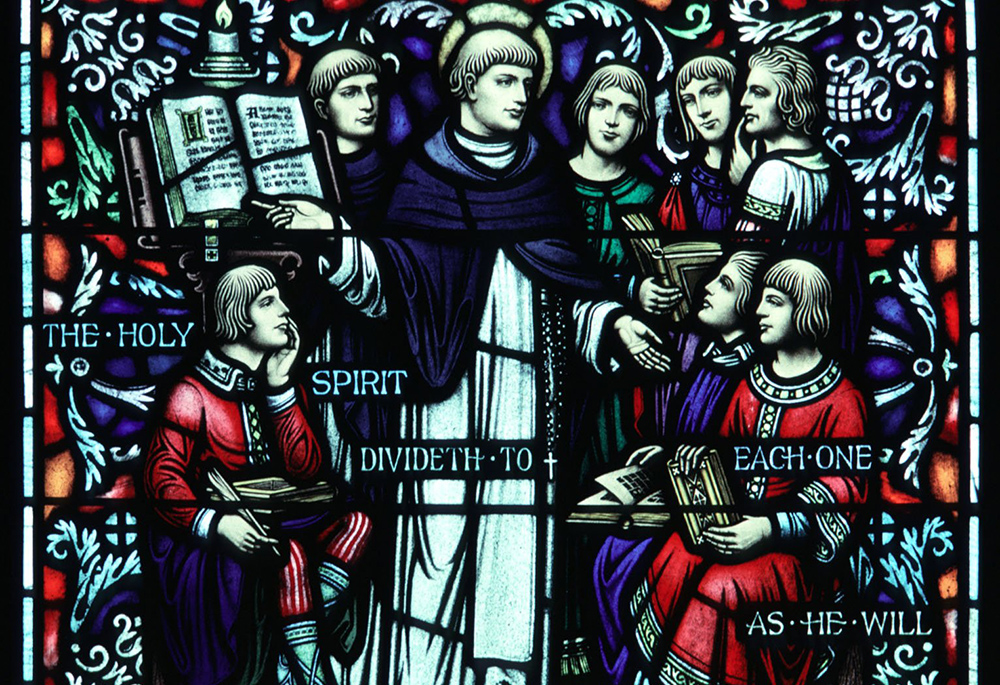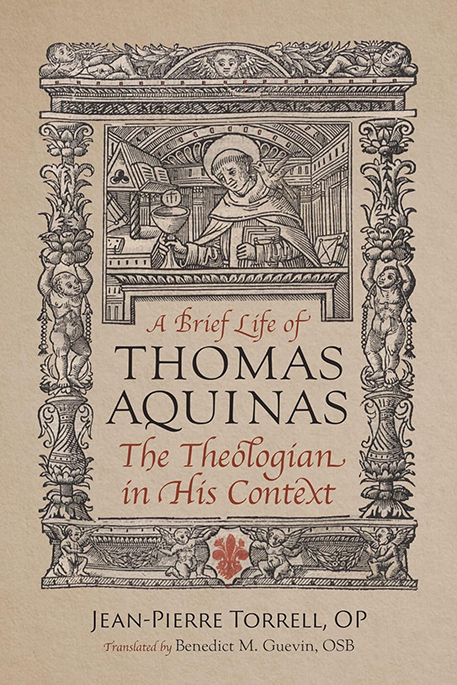
St. Thomas Aquinas is depicted with students in a window at St. Peter's Church in St. Peter, Minnesota. He wrote Summa Theologiae and articulated a theological synthesis that would influence Western Christian thought for centuries. (CNS/Crosiers)
In almost two millennia, only 37 saints received the title doctor of the church for their contributions to church teaching. Among them is Thomas Aquinas, who, additionally, has been awarded the titles the Common Doctor, the Angelic Doctor and the Doctor of Humanity. Seminarians and lay theologians immerse themselves in Aquinas' syllogistic style in pursuit of wisdom that shaped church thought for 800 years.
But many laypersons are unable to commit themselves to such immersion, making Aquinas' contributions sadly inaccessible to the faithful. For these, Jean-Pierre Torrell's new book, A Brief Life of Thomas Aquinas: The Theologian in His Context, is a gift. Torrell, now in his 90s, committed his life's work to studying Aquinas' teaching and sharing the fruits of those labors with the masses.

A Dominican priest, Torrell served on the faculties at the University of Fribourg, Switzerland, and the Pontifical Gregorian University. Among his works translated into English include his two-volume biography, Saint Thomas Aquinas: The Person and His Work and Saint Thomas Aquinas: Spiritual Master, as well as Christ and Spirituality in St. Thomas Aquinas and Aquinas's Summa: Background, Structure, and Reception.
Originally published in French in 2019, A Brief Life of Thomas Aquinas is designed to serve an audience who "tried to read something by St. Thomas or about him" and found the language to be an "unforeseen obstacle." To the inspired yet uninitiated, Torrell seeks to offer a hand.
To that end, Torrell's work is a compelling success. By understanding the life and times in which Aquinas labored, Torrell believes readers will gain an appreciation for how Aquinas served the church then and now. He labors in the belief that "in Thomas's thought everything is explained from the end that one pursues." For Aquinas, "It is the truth of the faith that he wants to grasp and understand, expand and defend." In Torrell's estimation, everything else for Aquinas is just detail.
To the inspired yet uninitiated, Torrell seeks to offer a hand.
"There is no break when Thomas moves from the professor's chair to that of preacher," notes Torrell. For Aquinas, his spiritual doctrine and his theology are inextricably tied to one another. To conceive of the university and the church, for example, as wholly distinct from one another would prove inconceivable to Aquinas. Often foreign to contemporary sensibilities, one challenge to understanding Aquinas is what one believes and how one lives are woven together in what it means to be human.
With those aspirations in mind, Torrell organizes A Brief Life into two parts. The first includes eleven concise, chronologically organized chapters. "Early Years" opens the section, focusing on the family in which Aquinas was raised and their views on his calling. The closing chapter is "The Last Time Teaching in Naples, 1272-1273," which charts the cessation of Aquinas' writing.
Advertisement
The chapters that make up part one, while organized chronologically, are defined by the projects on which Aquinas was working at the time. For example, while details concerning Aquinas' Summa — the project he never completed — spill into later chapters, they define the scope of the seventh chapter, "Summa Theologiae."
The second part of A Brief Life is composed of chapters organized thematically rather than chronologically, concerning the sources upon which Aquinas depends, the theological commitments he advances and the nature of God he appreciates. Considering the great value they add to Torrell's project, one wonders whether these three chapters should have come first to grant A Brief Life a more insightful introduction to the esteemed theologian.
Laypersons interested in immersing themselves in the life and legacy of Thomas Aquinas would be well served by reading A Brief Life of Thomas Aquinas. Only titles such as G.K. Chesterton's St. Thomas Aquinas: The Dumb Ox can compare to Torrell's work here, an offering that comes with the blessing of explanation "from the end that one pursues."






